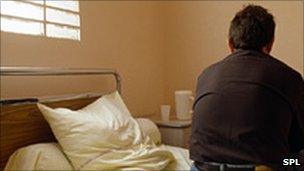Overhaul of mental health laws improves recovery rates
- Published

Fewer people are being detained for long periods in hospital as a result of the changes
An overhaul of mental health laws in Scotland has resulted in fewer people being detained for long periods in hospital, according to the Mental Welfare Commission.
Its report on the impact of the Mental Health Act 2003, external also said recovery rates had improved.
The act made it possible to give people compulsory treatment in the community, rather than detain them in hospital.
The report said compulsory community treatment orders had been a success.
The orders force people with a severe mental illness to take medication, without restricting their freedom in other ways.
The Mental Welfare Commission for Scotland, a statutory body which works to safeguard the rights of people with a mental illness, reported that the majority of more than 100 people interviewed said community treatment had been of some benefit.
The number of people being sectioned in hospital has also reduced by a third.
The "Lives Less Restricted" report made some recommendations for improvement.
It said services should review the order more frequently.
They should also plan with the individual towards a point where the order was no longer needed, the commission said.
The Scottish Borders has a high use of community compulsory treatment.
Dr Donald Lyons, chief executive of the Mental Welfare Commission, said: "We continue to regard compulsory community treatment as a priority for our attention.
"We will look further at our findings from this report and our forthcoming work on crisis support and intensive home treatment.
"As the balance of care continues to move away from hospital and into community settings, we will be an important safeguard in ensuring that people are given the care that meets their needs and respects their rights."
- Published11 August 2011